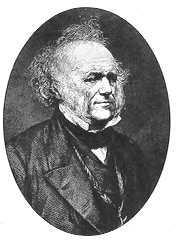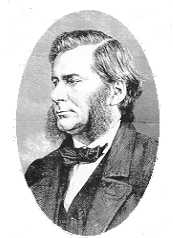Sir Charles Lyell (1797-1875) was a British geologist.
In his Principles of Geology (3 volumes, 1830-33),
Lyell conclusively showed that the earth was very old
and had changed its form slowly, mainly
from conditions such as erosion. Lyell was able to
date the ages of rocks by using fossils embedded
in the stone as time indicators.
Charles Darwin made use of Lyell's data
on fossils for his theory of evolution. Lyell
himself had believed that the various species of plants
and animals had remained
unchanged since they were created. When
confronted with Darwin's findings, he admitted "I now realize I have been looking
down the wrong road." He became one of
Darwin's strongest supporters.
Lyell was born in Scotland. He studied
geology at Oxford University and traveled on several geological
expeditions in Europe and North America.
But the first and one of the strongest supporters of Darwin's theory was Thomas Henry Huxley (1825-1895). A British anatomist and physical anthropologist, Huxley became the foremost advocate of the Darwinian theory and he was often called 'Darwin's bulldog'. In his book Evidence as to Man's Place in Nature (1863) offered proof for Darwin's thesis of natural selection. He was Professor of the Royal College of Surgeons and President of the Royal Society.
Walk to Room 2 
Walk back to Entrance 
D. I. Loizos, 1996-1998
![]() Room 1
Room 1


